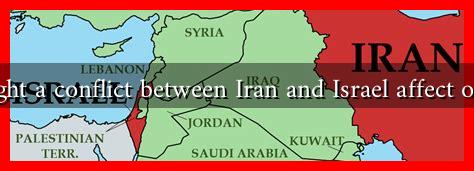-
Table of Contents
How Might a Conflict Between Iran and Israel Affect Oil Prices?
The geopolitical landscape of the Middle East is fraught with tension, particularly between Iran and Israel. Both nations have a long history of animosity, and any escalation in their conflict could have significant repercussions, especially in the global oil market. This article explores how a potential conflict between Iran and Israel could impact oil prices, considering various factors such as supply disruptions, market speculation, and historical precedents.
The Importance of the Middle East in Global Oil Supply
The Middle East is home to some of the world’s largest oil reserves, making it a critical region for global energy supply. Countries like Saudi Arabia, Iraq, and Iran are among the top oil producers, and any instability in this region can lead to fluctuations in oil prices. Key points to consider include:
- Oil Production: Iran is a significant player in the oil market, with production levels that can influence global supply.
- Strategic Shipping Routes: The Strait of Hormuz, through which a substantial percentage of the world’s oil passes, is located near Iran.
. Any conflict could threaten this vital shipping lane.
- Regional Alliances: The Middle East is characterized by complex alliances, and a conflict could draw in other nations, further complicating the situation.
Potential Scenarios of Conflict
In the event of a conflict between Iran and Israel, several scenarios could unfold, each with different implications for oil prices:
- Direct Attacks on Oil Infrastructure: If Iran were to retaliate against Israel by targeting oil facilities or shipping routes, this could lead to immediate supply disruptions.
- Market Speculation: Traders often react to geopolitical tensions by speculating on future oil prices. This can lead to price spikes even before any physical supply disruptions occur.
- International Sanctions: A conflict could prompt renewed sanctions against Iran, further limiting its oil exports and tightening global supply.
Historical Precedents
To understand the potential impact of a conflict between Iran and Israel on oil prices, it is essential to look at historical precedents:
- 1973 Oil Crisis: The Yom Kippur War between Israel and a coalition of Arab states led to an oil embargo by OPEC, resulting in skyrocketing oil prices.
- 2006 Lebanon War: During the conflict between Israel and Hezbollah, oil prices surged due to fears of regional instability, despite no direct impact on oil supply.
- Recent Tensions: In 2019, attacks on Saudi oil facilities by Iranian-backed groups led to a significant spike in oil prices, demonstrating how quickly markets can react to perceived threats.
Current Market Dynamics
The current state of the oil market is also a crucial factor in understanding how a conflict might affect prices. As of late 2023, oil prices have been influenced by various factors, including:
- COVID-19 Recovery: The global economy is still recovering from the pandemic, leading to fluctuating demand for oil.
- Renewable Energy Transition: As countries shift towards renewable energy sources, the long-term demand for oil may be affected, but short-term volatility remains.
- Geopolitical Tensions: Ongoing tensions in other regions, such as Ukraine, also play a role in shaping oil prices.
Conclusion
A conflict between Iran and Israel could have profound implications for global oil prices. The interconnectedness of the Middle East’s geopolitical landscape and the global oil market means that any escalation in tensions could lead to immediate price spikes due to supply disruptions and market speculation. Historical precedents show that even the threat of conflict can lead to significant price fluctuations. As the world continues to navigate a complex energy landscape, understanding these dynamics is crucial for investors, policymakers, and consumers alike.
For further insights into the impact of geopolitical tensions on oil prices, you can explore resources from the U.S. Energy Information Administration.





